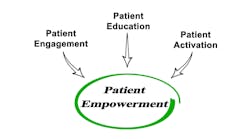University of Chicago Medicine Recognized for Community Engagement
The University of Chicago Medicine health system and the University of Chicago Pritzker School of Medicine have been recognized by the Association of American Medical Colleges (AAMC) for its commitment to identify and address the community's needs through engagement, partnership and collaboration.
The AAMC has presented the Chicago organization with the 2024 Spencer Foreman Award for Outstanding Community Engagement for prioritizing community engagement, particularly through medical education, research and clinical care.
“By embedding community engagement into every aspect of medical education, research, and clinical care, the University of Chicago Pritzker School of Medicine and UChicago Medicine have demonstrated profound commitments to improving the health and well-being of all individuals who call the South Side of Chicago home,” according to the AAMC in its announcement.
“Through our mission, vision and values and across all of our strategic initiatives, UChicago Medicine and the Pritzker School of Medicine are committed to advancing health equity within the communities we serve,” said Mark Anderson, M.D., Ph.D., dean of the Biological Sciences Division and of the Pritzker School of Medicine at the University of Chicago, in a statement. “We are greatly honored by this recognition from the AAMC, which reflects the values and strength of everyone within our organization and the partnerships that help inform and shape how we engage with the community.”
Medical students learn about health inequities and social determinants of health through coursework and by volunteering at six student-run free clinics and in a street-medicine outreach program. They also engage directly by participating in programs like Medical Careers Exposure and Emergency Preparedness, which exposes historically underrepresented youth to careers in medicine and has trained more than 7,000 individuals in emergency preparedness since 2018.
Earlier this year, the Pritzker School of Medicine launched The Phoenix Curriculum, an updated educational framework designed to empower students to serve as patient advocates, incorporating self-directed learning, research, clinical experience and community engagement from day one.
At the graduate medical education level, residents across multiple specialties collaborate with community members to address health needs through the Graduate Medical Education Community Champions program, in partnership with the Urban Health Initiative, UChicago Medicine’s community health division that works to improve health equity for more than 880,000 residents of Chicago’s South Side and south suburbs. Now in its fourth year, the Community Champions program trains approximately 30 residents from 12 departments annually to work in communities dealing with a disproportionate burden of chronic and serious diseases and high rates of intentional violence.
“Receiving this award validates our efforts to ensure our programs and outreach initiatives across medical education and clinical care prioritize health equity and reflect a commitment to serve our diverse communities,” said Vineet Arora, M.D., dean for Medical Education, in a statement. “We are inspired to further this important work with and for the community and encourage the next generation of healthcare professionals to grow as leaders and champions of health equity.”
As a founding member of the South Side Healthy Community Organization, a collective and coordinated network of 13 local healthcare organizations including safety-net hospitals, health systems and Federally Qualified Health Centers, UChicago Medicine uses its resources to better connect existing health organizations, increase access to care and improve health outcomes for South Side residents.
The AAMC Spencer Foreman Award for Outstanding Community Engagement was renamed in 2007 to honor Spencer “Spike” Foreman, M.D., who established the award in 1993 while serving as chair of the AAMC.
Founded in 1876, the AAMC represents 171 accredited U.S. and Canadian medical schools, more than 400 teaching hospitals and health systems, and over 70 academic societies. It is dedicated to transforming health through medical education, healthcare, medical research, and community collaborations.


